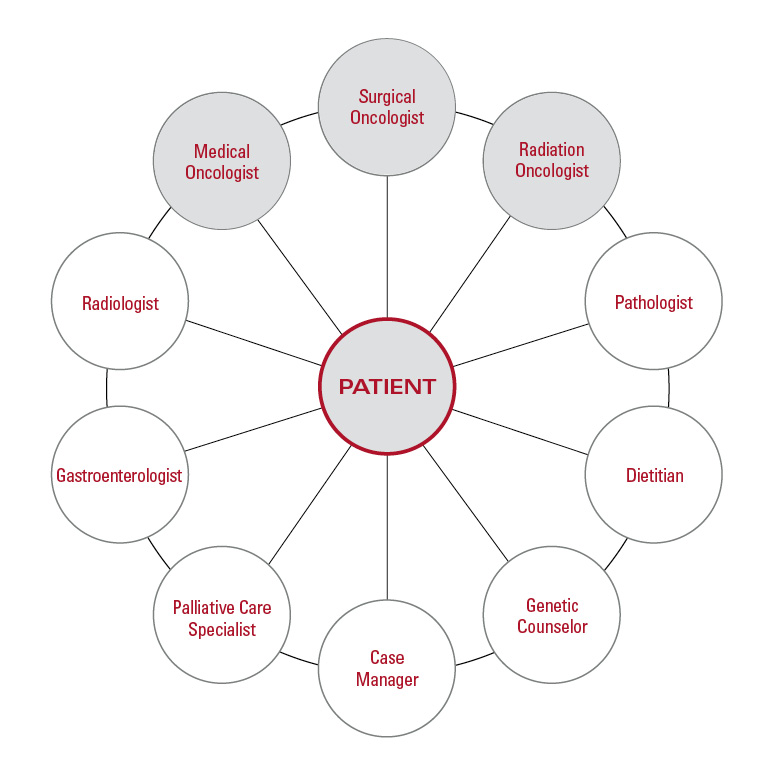Pancreatic cancer treatment: Experience matters

November is Pancreatic Cancer Awareness Month
Pancreatic cancer has received much publicity in the past year. In March, Alex Trebek courageously announced his diagnosis to raise awareness about the disease, and has continued to host "Jeopardy!" while undergoing treatments. Other well known individuals who have battled pancreatic cancer include Aretha Franklin, Ruth Bader Ginsburg, Luciano Pavarotti and Patrick Swayze.
If you need a tumor removed from the liver, pancreas, gallbladder or bile ducts, you may qualify for robotic surgery. Call 800.922.0000 to schedule an appointment.
Pancreatic cancer is an aggressive disease
It is estimated that more than 56,000 people will be diagnosed with pancreatic cancer in the United States in 2019. Despite being the 11th most commonly diagnosed cancer, it represents the third most common cause of cancer related death, behind only lung and colon cancer. This is because pancreatic cancer often spreads to other parts of the body long before it causes symptoms to signal that a problem exists. As a result, more than 50% of all patients initially diagnosed with pancreatic cancer have stage IV disease. Among the remaining patients, more than 30% will develop "locally advanced" disease, which means the mass has grown to involve important vessels (arteries or veins to the liver or intestines) that may prevent a safe surgery to remove it.
Pancreatic cancer treatment requires a team of specialists
Like the disease itself, the treatment of pancreatic cancer is complex, and is strongly determined by a comprehensive evaluation of the disease at initial diagnosis. Treatment often requires multiple types of therapy, including chemotherapy, potentially radiation and surgery, if possible. A team of providers, ideally, those specialized in treatment of pancreatic cancer, is needed for successful treatment. This team should include a medical, radiation and surgical oncologist, gastroenterologist, radiologist, pathologist, palliative care specialist, dietitians, genetic counselor, case manager, nurses, physical and occupational therapists, social workers and financial counselors.

The experience of your multidisciplinary team matters
As providers, we use evidence from research to support as many of our treatment recommendations as possible. When strong evidence does not exist or is not sufficient, we must use our training, experience, and judgment to offer a recommendation that best serves each patient. Since pancreas cancer is a rare and complex disease, many of the recommendations that medical, surgical and radiation oncologists make for patients do not have strong evidence to support them, which can lead to wide variability in practice between institutions and individual providers.
When radiation therapy or surgery are considered, the importance of provider experience with pancreatic cancer is magnified. Successful radiation therapy, and safe performance of pancreatic surgery, are highly dependent on the technical skill and experience of the provider, and often require significant institutional resources and support during treatment and recovery. If you or someone you love has been recently diagnosed with pancreatic cancer, take time to carefully research the experience of the provider and hospital options available to you for treatment. Here are some examples of important questions you will want to consider:
- How many pancreas cancer patients do they treat annually?
- How many locally advanced pancreas cancer patients do they treat annually?
- How many pancreas surgeries do they perform annually?
- How many pancreas surgeries are performed annually at the institution?
- Does the institution have a dedicated multidisciplinary team and a regularly occurring multidisciplinary conference?
- Are clinical trials for pancreas cancer available at the center or institution?
The future of pancreatic cancer treatment is promising
In the last decade, the survival of patients with pancreatic cancer has substantially improved as new treatment approaches, chemotherapies, and drugs have been introduced. Even more exciting research is currently underway. I am very confident that with a continued emphasis on pancreatic cancer awareness, basic science and clinical research, and experienced multidisciplinary care, these trends will only continue.




